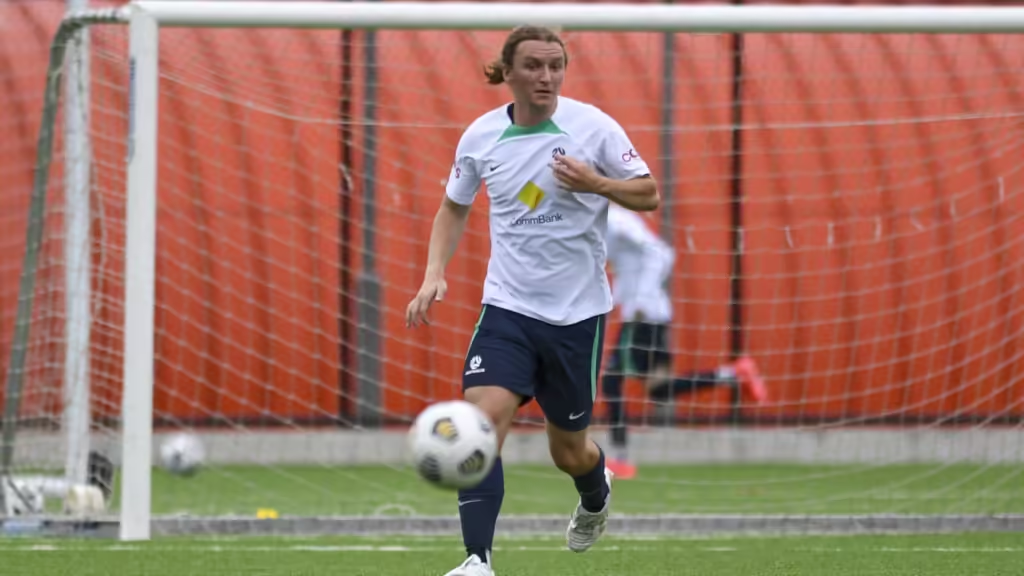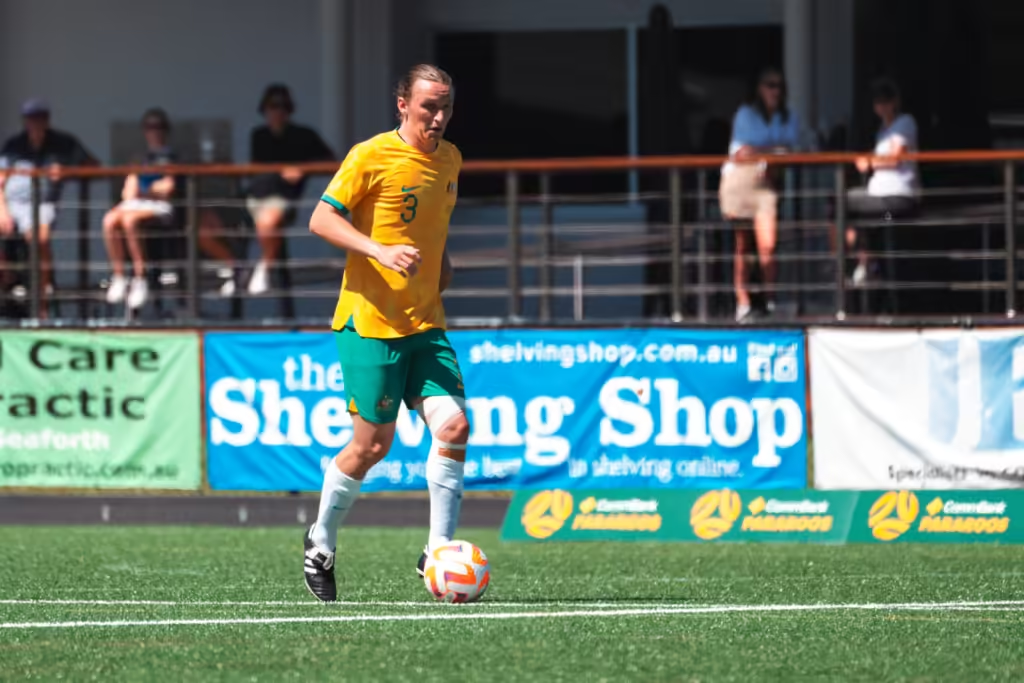
Taj Lynch during a practice match for the Pararoos ahead of the 2024 IFCPF World Cup. Photo: Mark Avellino/Football Australia
Pararoo Taj Lynch is getting ready to represent Australia at his second IFCPF World Cup, taking place in Spain, where the Aussies will be hoping for their best ever finish in the tournament.
Lynch said he feels excited to be part of the squad, which he also said is a group that he feels can go and get a good result, but just because it sounds simple, that does not mean that it is.
“We have to win six games, so if we go into the first game, we’re never going to go into a game not trying to win,” he said.
“We’ve got teams [in our group] that we’ve shown we can do better than. We’ve shown we can draw against the US, we’ve shown we can beat Thailand.
“If we go into these games with the right mentality, wanting to win, working hard for it, we have three wins and all of a sudden we’re three wins away from winning a World Cup.
“It’s exciting when you think about it that way. One game at a time we want to win, and if we can do that as well as I think we can, then we can go pretty far.”
The preparation and the journey to Spain is a tough one for the Pararoos, who despite having a pre-tournament camp in Australia, had to travel only a few days before the tournament started, and upon arriving, have to handle jet lag, getting acclimated, classification, and training, all while preparing for their opening game against world number four, USA.
Football Australia has put a good team in place to make the squad’s preparations as easy as possible to give them the best chance of success.
“Our medical team are very very good, they’re really on top of things, like how we sleep on the flight,” Lynch said.
“You end up doing 27, 28 hours of travel straight, so how you sleep through that period is really important.
“They’ve been really good at planning our training sessions so far so that when we do flip into a new time zone, our bodies are used to training and playing at the time that we are right now.”
One of the hardest parts of preparing for a tournament involves the classification process, which is a three-stage process including a physical, technical, and an observation assessment, with players sorted into FT1, FT2, or FT3.
“Due to the resources, they can’t get classifiers out, [and] we couldn’t have an Australian classifier come in and classify our team,” Lynch said.
This presents a massive challenge, where you have to select and submit your entire squad without knowing where some players will ultimately end up until the process happens, and it massively impacts everyone involved as a result if things do not go as expected.
“In 2017, we had a player get classed out at the start of a tournament, and he wasn’t able to play,” Lynch said.
“It’s tough for him as a person. He’s flown all the way to Argentina and didn’t get to play.
“It’s a tough thing to be told, because you have a disability, but you’re being told ‘hey, sorry, you’re actually not disabled enough for what we’re doing here.’
“I understand that it exists to maintain a level of fairness in the sport, but it’s definitely tough for individuals.
“We’re very fortunate [that] our team’s very good in planning out from a coaching point of view and we have support staff as well, [including] Chris Lynch (the National Men’s Wellbeing Officer for Football Australia) comes along with us, [and] there’s a lot of time and effort that’s gone into planning how to deal with classification changes and not just from a team point of view but us as individuals and our wellbeing with that as well.”

Following the World Cup, Lynch has an exciting new role to prepare for with the Illawarra Stingrays, as he will join the club as the Head of Junior Development.
His journey into coaching started when he was training at NWS Spirit ahead of the IFCPF Asia-Oceania Championship in 2018, which turned into coaching NPL Mixed SAP (Skills Acquisition Phase) at the club, before moving to Wollongong and spending time coaching in the youth league before moving into his current role.
“I think the junior space is exciting because I think there’s a lot of room to grow and develop,” Lynch said.
“It’s a fun age to teach football because you get all the joys of teaching and learning new things without the stress of a table and finals and everything that comes along with that from the club and a parent and a player pressure perspective, there’s none of that. They get to just learn which is really exciting for me.
“I think that playing for your country brings with it experiences and understandings of football that a lot of people don’t have.
“So when I have a young girl that’s going into the nationals championship, I think I can shed a bit of light on that experience of being away with a team and things that you want to take out of that and playing games day in, day out, living, breathing football.
“It’s a unique experience and not many people have done it, that two, three weeks where you’re on a schedule and that schedule is centered around football.”
In the long-term, Lynch wants to keep pursuing coaching, and one day would like to see himself helping to provide top level opportunities for CP Football, mirroring that of able-bodied football.
“There’s a lot of really good things happening in the all-abilities space and I think that’s really important that that does exist because it’s something anyone with a disability can get involved in and anyone with a disability can find that love of football.
“Whether that’s a way to keep them fit and active, whether it’s something they really enjoy doing, it’s important that that’s there.
“We saw Western Sydney Wanderers have done really well recently to push a lot of inclusivity programs, but that elite disability sport, there’s not really any pathways, outside of the state teams and the national teams.
“There’s not a lot of week in, week out playing 7-a-side, whereas other countries that are at the top level, they have that domestic competition.
“That’s something that one day we need to push forward and have, but again it’s tough. Money and resources and things like that.
“In terms of my coaching, that’s one day where I’d like to be able to go.”
